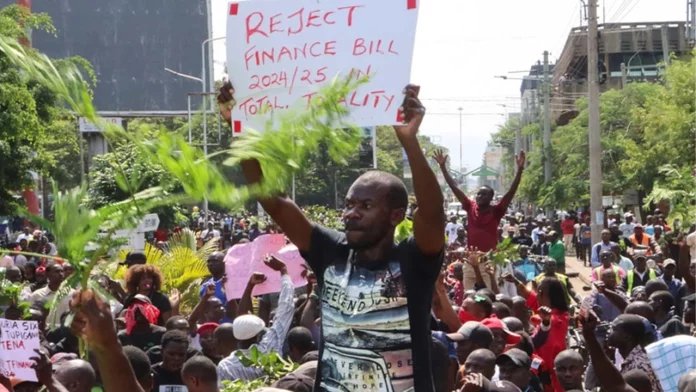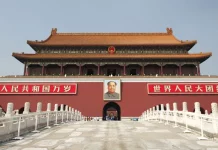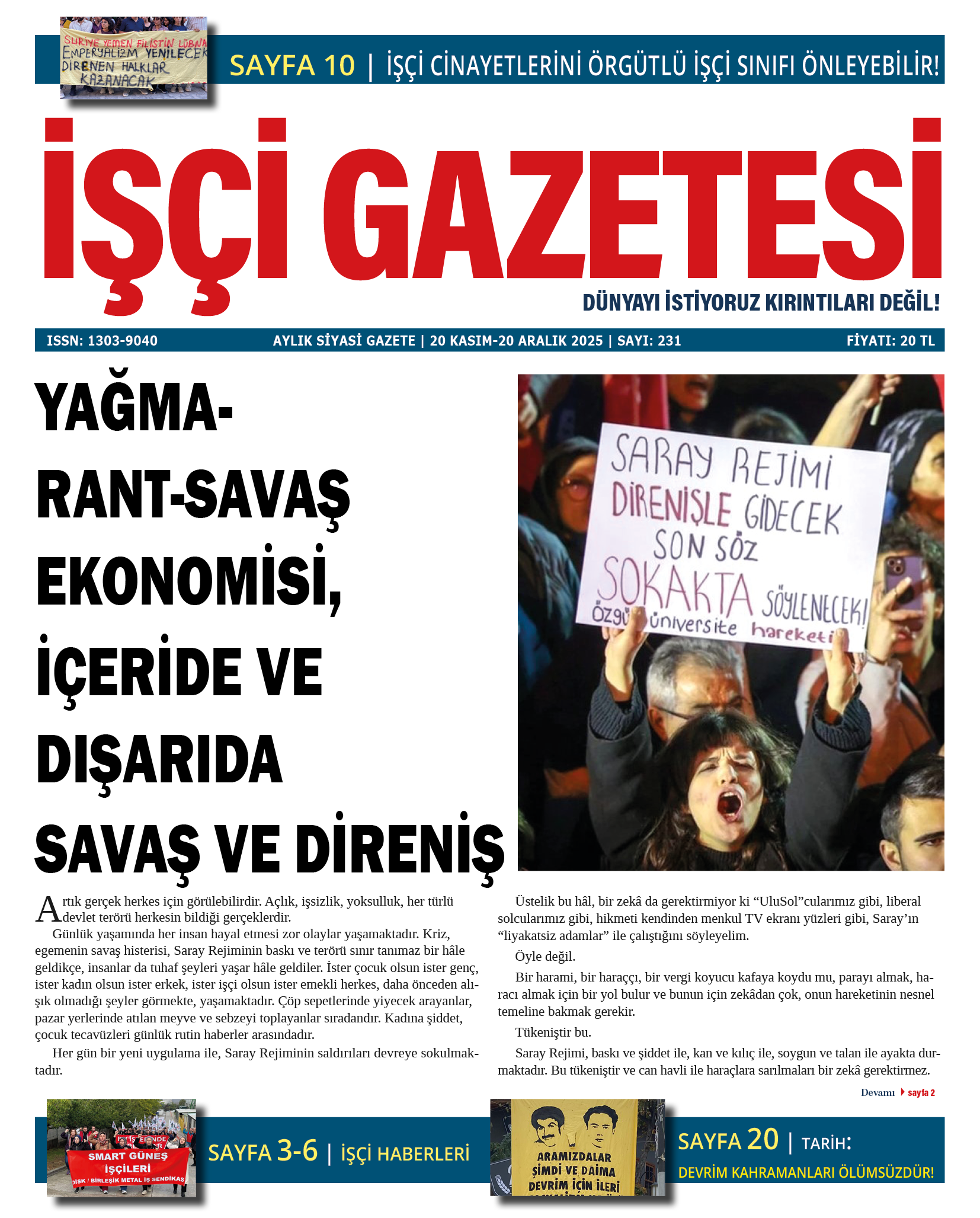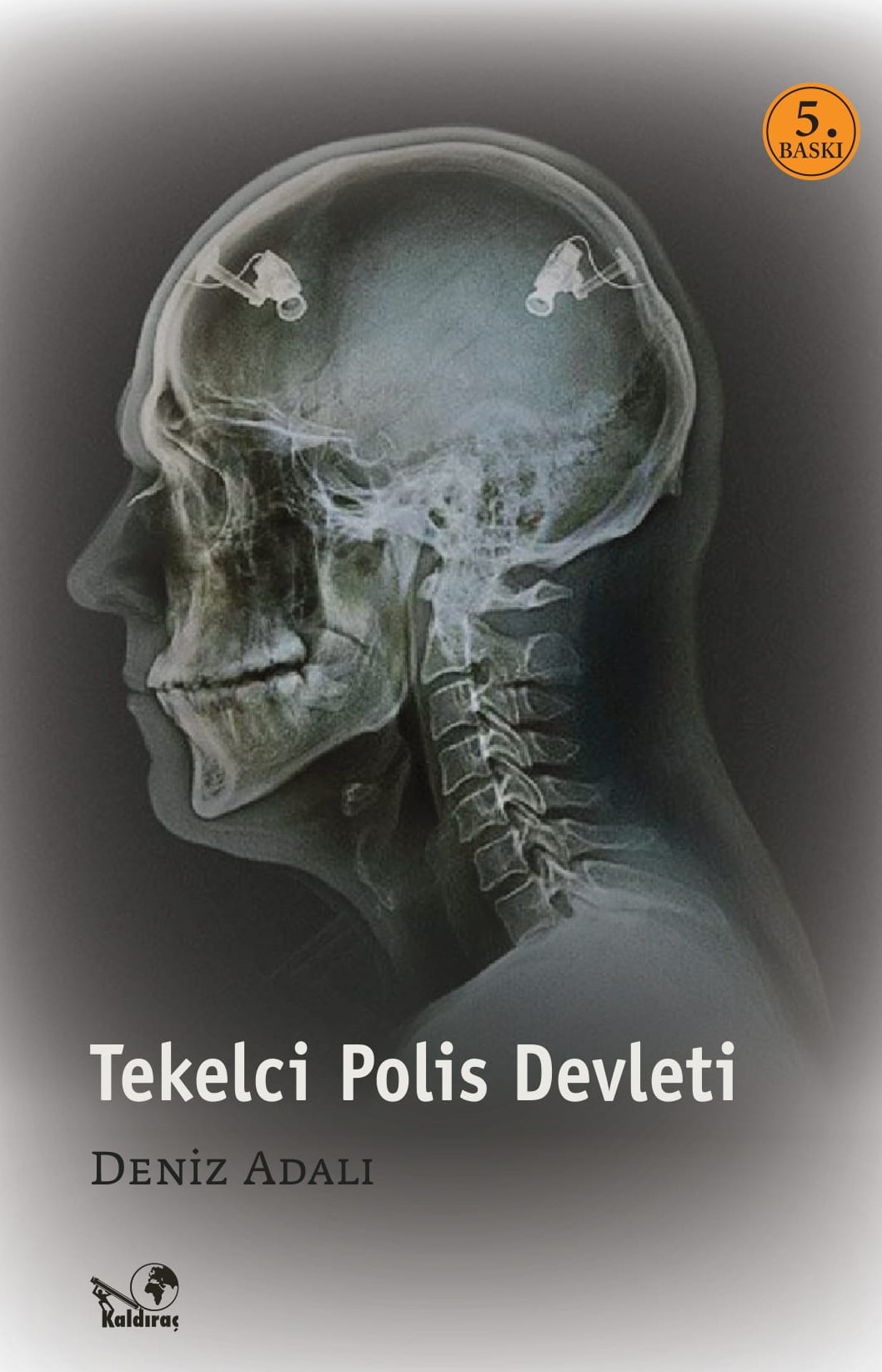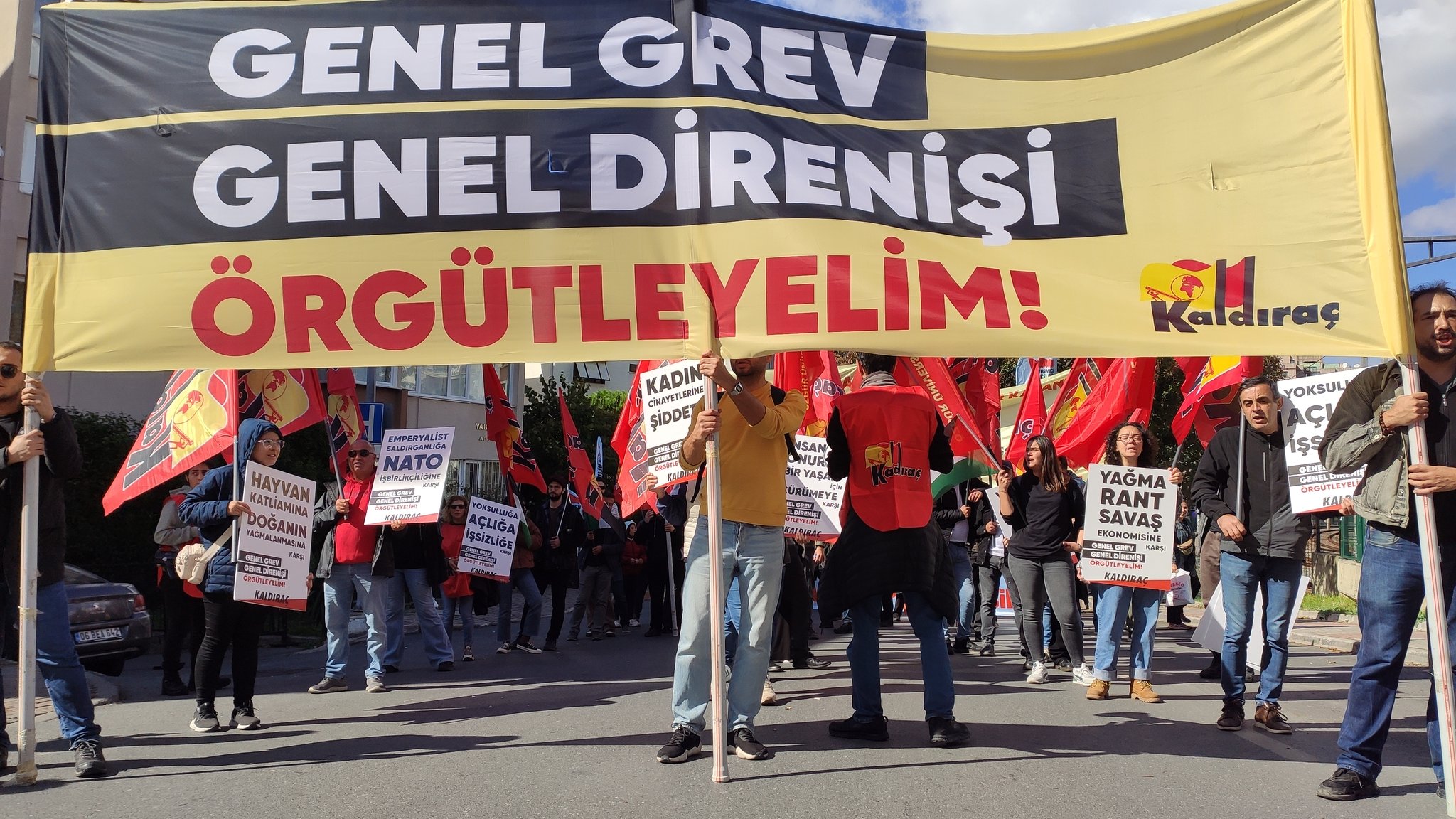This interview was conducted with Jared Oyie from National Students’ Caucus in Kenya on 8.7.2024.
Kaldıraç International: Let’s begin our discussion with the protest you have with your coalition tomorrow. What is the main goal of this protest? You said there are about 50 political organizations in the protest. What are the main slogans and main political aims of this protest?
National Students’ Caucus: Okay, so the main slogan is Tunakata. Tunakata means that we are refusing, we are not agreeing, Tunakata. So, we are not agreeing with the American puppet Ruto. Even on his new appointees that he brought to us after firing the cabinet. Tunakata to Ruto himself. We want Ruto himself and his center government to go home. We want a new system of government. Tonakata, we are refusing the brutalization because we have been on the street for two months now.
Though, we called it off, we had some recess period. I think now for one week we didn’t go to the street and the time that we gave Ruto, the guy, the gentleman, has not implemented anything. And that’s why we are telling him to Tunakata. We are refusing, or we are not agreeing with him, on his ideologies or the broad-based government, when he invited the opposition to join in the government. So that’s the main purpose. We want Ruto with his entire government to leave.
Ruto, when he got into power, he did not have a plan. He has been gambling . For the past two years, gambling, we can’t see anything, he has been gambling. We can’t see anything substantive from him and his government. We can’t see anything. That we can proudly say, we Kenyans. He continues to give us promises with no budget, with no consultation, no technocrats, no experts. So the main slogan is we refuse, we are not agreeing.
Kaldıraç International: Many across the world are very interested in your struggles and want to stand in solidarity with you, communicate your message, your spirit towards their our own respective geographies. Can you introduce your organization and its history to our readers? Can you describe the current the status of the student movement in Kenya overall?
National Students’ Caucus: So first, National Students’ Caucus is a far left, a progressive student organization that is a non-governmental, non-profit organization. The organization was built in 2018, when the government of Kenya was trying to implement a hybrid system of government and they wanted to use our universities as the laboratory for this government. This new government system has now been implemented in the government, or in the election of our leaders. They were bringing the American system of governance in the university, the delegate system. They brought it to the universities and there’s a bill that we, as the Student Caucus, petitioned in the Parliament for this system to be repealed. But up to date, our legislatures have been very reluctant to act on this bill and to repeal it.
When they brought this bill, this killed the momentum of the university politics and leadership. The university and college administration always have the upper hand in picking and selecting the student leaders that they can manipulate, student leaders who cannot speak on behalf of the students. These leaders can’t even address the hiked fee.
Today, this is one of the things that is making us, The Student Caucus, to join in the protest. The school fee is very high, and a number of comrades, students, some of them are committing suicide, some are deferring their studies completely, some are dropping out of school, some of them are hooked in drugs because they can’t afford, they can’t eat, they can’t live decently, they can’t pay fee, they can’t cloth. So that’s one of the reasons why we are on the street. So the bill gave the admin upper hand on selecting and picking non-popular students as student leaders, to be at the helm of the student leadership. This is killing the student leadership. That is the first point.
So the second one—I think these are the two areas that we have decided to take on in detail—is the hiked tuition fee. The hiked education cost. We say the commercialization, the commercialized our education. It’s not affordable, it is commercialized, a business. They are in business. The government is in business. The fee was hiked without consulting the major stakeholders, the students and their parents. And that’s why I’ll tell you today, a number of students will even prefer going to vocational training institutes instead of going to universities because it’s too expensive for them.
So we as student leaders, I think I told you the other day, we are having a mass campaign. We are organizing a mass campaign and we have been doing it in our universities, telling students that the fee must fall. We want the fee to fall. We want affordable education. Education is the equalizer. So if you’re going to commercialize, or enterprise our system of education then that’s one way of killing a nation. To kill a nation, kill the system of education.
And that’s what Mr. Ruto is doing because he started missing the education sector when he was the minister of education. That was in 2009. He was made the Minister of Higher Education in 2009, after being fired from the Minister of Agriculture where he was fired on the basis of corruption. He was then referred to the Ministry of Higher Education. So this is where the problem started.
In fact, I tell you, one of the prestigious universities in Kenya is the University of Nairobi. And they have chosen it to make it a political center on the VC (Vice-Chancellor) being chosen on a tribal line with the political alignment and allegiance and so on. And not only the University of Nairobi, a number of universities in Kenya here are being appointed on their political alignment. So we also want our university chancellors and VCs to be independent of political interference.
Kaldıraç International: Can you talk a little bit about the recent protests and the finance bill? What was the reaction from the state, the steps taken by the states and the concessions given? What’s going on now, what made the protests so widespread and what do you see the future to hold?
National Students’ Caucus: First, I think the finance bill was just a trigger that triggered Kenyans that we have been hungry for long. The hunger is high. The finance bill was just a trigger.
`We have a number of issues that have never been addressed and one of them at the center of the current conversation is bad governance, corruption, and incompetence. I want to talk about the broad part of the situation while we’re on the street, the gains we made, the lessons we learned, and even how the street itself messed up and that’s why we had to pull out and reorganize ourselves properly.
First, when we started off, we had a very proper online sensation, a very proper online education that was very organic. Nobody influenced it, nobody was influencing it from the NGOs, non-governmental organizations. Nobody was influencing it from the state, neither were opposition parties influencing it.
So it was organic from the people, the young people of Kenya who are at the center of this education. It took place and it was still made up on Tik Tok, Twitter, the two. Then you also have Instagram, Facebook, but the two have been very critical roles, the Tik Tok and the Twitter, X space, the X.
The government was caught unaware because they knew that we the young people can only rant online without substantial action taken on the street. So they were very reluctant to take any action to counter us. When we started off the strike, it was pro-people. Just for the people of.
I think there are a few areas that we failed. We also regret that the state tried very hard to infiltrate and plant goons, impose on us that they were like us. They tried to infiltrate us and also to counter us, to subdue us from progressing.
To make it very clear; the state tried three phases to sabotage us. Not three, but four. The first stage, in Kenya here, we have over 42 tribes. So they brought in the tribal card, that this tribe, we are from this tribe, now time for this tribe to fight, and not this tribe. That one failed. They brought the religion. They said those who are going to the state were being financed by Illuminati. This one also failed because it was to call the Christians or the children who are from Christian background to back off. This also failed. Then another narrative came back and said we are being financed from Russia. This also failed.
And they also brought another narrative that we are being financed by some NGOs. That is, the Ford Foundation. It also failed. So all these narratives failed, and then they brought a last narrative concerning the former president’s region. We call it the Mount Kenya region. Supposedly, the former president of Kenyatta and his cronies, were financing us to oust Ruto and to give Gachagua, his deputy president, the deputy president, a chance to be president. Of course, some of us are talking about the entire Ruto government, including his chief principal assistant, the deputy president Gachagua to pack and go. So we are still supporting either of them.
So all the narratives of the government, of the state, failed. After all the narratives failed, they resorted to abductions, killings, and threats. And this also has failed. It’s failing even now. They have been trying. Yesterday we had people’s assemblies in different areas, and that’s what I think I’ll talk about later. They attacked. They abducted some of our comrades yesterday. We are people’s assemblies. This also failed. Today as we talk, the government is in panic mode. So that’s what the government tried.
And then another thing that they try to push; Ruto played with the psychology of the young people with saying that he was going to bring in the new cabinet. In fact, the old cabinet of 21. Some of us are telling him, hey, gentlemen, reduce that number. It’s too big. The 22 cabinet ministers doing what? So what did he do? He fired them. Then after two weeks, he hired half of them, those who were fired. So I’m asking him, because he fired them on the basis that they were incompetent. After two weeks, now they were competent again?
Today we talk about finance bill. These are the bills to be ascended for him to tax us still. So the finance bill was shut down, but he’s sneaking the bills into parliament through the back door. He’s sneaking the bill into the parliament. He’s controlling the parliament. This guy has bought parliament. The MPs are being bought at two, two million Kenyan shillings. The only hope we have for them, our government, is the court that is trying to be a bit independent. So he’s sneaking this bill back into Parliament through the back door.
When we went to Parliament on 25th of July, it was a great success to us. Though, we were not to go back home. It was a mistake we did. And we learn from it. The mistake was us going back home after reaching Parliament. What we were going to do, what we were to do, we were to bring it down. Bring the parliament down. That’s a failure.
Coming back the next day was a mistake because we were giving him time to reorganize himself and his arsenal. We reached the parliament, but we didn’t do what we wanted to do. We wanted to do it the Burkina Faso way. Bring it down, we start anew, we start again. And then that same day we were to go to the state house.
So that was a mistake, because today we are saying, tomorrow we are going to the state house. We were to go to the state house on the 25th. So I think that was a mistake we made because we left, we aborted, we aborted the revolution, which was unfortunate because we felt that we had done the job. We did a job halfway. We gave him a space to reorganize himself to attack. It’s now back on us. So we had to pull out, reorganize, re-strategize and then hit.
So, those are some of the things that I think we learned when we did a mistake. We didn’t finish the job completely. We were to finish it then. Now it is very difficult to finish it. We are reorganizing, re-strategizing, they have deeply infiltrated us, we don’t know who is who now. Even the comrade next to you, you can’t trust him fully because you don’t know. So, that’s where we are. But, we say that the struggle must continue.
Kaldıraç International: You said that after going to the parliament you shouldn’t have gone back home. What were the dynamics that led to that mistake? Was there a lack of will or lack of planning? How do you assess why you couldn’t finish the job? Was it because the masses were not ready or the leadership wasn’t ready?
National Students’ Caucus: Yeah, I think when you are following our demonstration, the mass uprising, the action days on the street, they were partyless, they were leaderless, they were tribeless, they were fearless. But we’re failing in two areas. We can’t have a successful revolution without leaders.
We failed because the minute we were on the street, we knew that we were leaderless and partyless. We couldn’t have a successful revolution without being led. So there were some online influencers, who tweeted that it’s time to go home. The state sent fear to the young people that there will be state of emergency. When this came up, which was again a lie—they were lying to us when the Congress acted as though there was a state of emergency—some of them said to pull out of the street to go back home.
And then there was no proper leadership to give directions on the action, on what happens next. And that’s why today we have recollected ourselves with 48 progressive forces to offer a leader, a structured revolution. So that’s where we failed.
There’s an activist here. One of the activists, currently part of our organization that we are trying to put up for the leadership. He tweeted that the state is going to impose a state of emergency. Of course they wanted to but the army refused because it was not constitutional to do it then. So when he tweeted that a number of comrades bought that fear that the state of emergency is dangerous for us, they will be brutalized, they will be shot, killed and so on.
Some of them pulled out of the street and went home. And the comrades did not have leadership to give them direction on the next action after reaching parliament. What did you do? What do we do in parliament? After we are in, what we are supposed to do in parliament, what next? What do we do next? So, there was that vacuum. It was leaderless. That’s where we were also under failure.
Kaldıraç International: During all this, the Communist Party, the National Students’ Caucus supported the view that there has to be leaders in the revolution. Do you think that in that moment, there wasn’t a wide coalition that the party could lead? Is that what you’re trying to accomplish now? What was the party’s line at that moment? Was it trying to lead or become a leader, but it didn’t reach enough people? How do you change your strategy now to have a clearer vision?
National Students’ Caucus: My comrade brother, and other comrades, we have had over 30 people’s assemblies to discuss on the way forward and offer ourselves to lead this mass uprising and to be at the center of direction on what to be done, when and how. Even before, Communist Party of Kenya and other progressive organizations were in the forefront in organizing, mobilizing their communities to come to the streets. Though they didn’t offer leadership then because a number of those were on the street were not aware of, they were not part of the Communist Party of Kenya and any other progressive wing in this country. So that is one of the reasons.
For the leadership, again, from the city, we have also identified those who are revolutionary but are not aligned to any progressive organization. So we also need them to be part of the movement, be it CPK, be it the social justice centers, be it the National Students’ Caucus.
We have tried to pick the best on the street and also to infiltrate the masses and let them know that we are able, that we are capable of giving them direction. We have been offering our press statements as well on our main media streams here in Kenya.
Kaldıraç International: In the resistance now, what are some of different groups and dynamics between them, like students, workers, maybe professional organizations, doctors, health workers, other coalitions, farmers, womens’ organizations?
National Students’ Caucus: Not only the progressive forces are in this coalition, we now have the coalition that brings even the professional bodies.
We have the LSK, the Law Society of Kenya. We have the teachers organization. We have the young engineers, we have the farmers. In fact, there’s a bill in parliament that we are in the forefront and farmers are in support of it on the GMO seeds being imposed on us. We want our local African seeds to be at the center of our production in our farms, not the GMO seeds. So even the farmers are with us. We also have the professional body, we also have the nurses and doctors who have been on the strike. They’re also with us. We also have business communities with the organizations. They’re with us. So that’s what makes the 48 on the broad coalition.
And then with the Progressive forces, we are having an alliance, PASA, Progressive Alliance. So we, the Student Caucus, National, CPK, RSL (The Revolutionary Socialist League,) All African People’s Party, The Coalition of Change. So we have two tiers. We have an alliance and then we have a coalition.
Kaldıraç International: For the last 10 years, in Lebanon, Sri Lanka, Bangladesh, now in Bangladesh, we see different protests and uprisings, which cause changes in governments, or sometimes of presidents. But eventually the same system continues with a different face, the same capitalist system continues. You also mentioned you want the whole of the government to pack and go. How do you see the possibility of this? What kind of change do you support, do you support a change that’s more systemic?
National Student Caucus: I think I need to be very clear that Kenya is a bit complex and interesting country. In Africa, Kenya is among the four countries in Africa that are pillars of the imperialists: South Africa, Kenya, Egypt, and Nigeria. So, Kenya being the entry of the imperialists and their sympathizers, it is so interesting because they have a vast interest in this country. This is the only way they can get the Congo minerals. They can’t get Congo minerals without Kenya. This is the only way they can access Uganda, they can access Sudan.
So you see, if Kenya is destabilized, the imperialists, the neocolonialists, our colonizers, they are shaken. Because for them to shake Ethiopia, Somalia, all this destabilization we have been seeing in eastern and some parts of central Africa, Kenya is the end. The reason why even the far left organizations in Kenya have always been suppressed is this.
And that’s why, I said they have previously tagged the name of Russia to be part of our finances. No! We don’t have this. I’ll tell you, if we could have got those funds, we could have done wonders, an amazing job in Kenya. If Russia could have been here to sponsor and support us, it could have been different.
That’s why they’re trying to drag the name of the Eastern powers, that they’re part of this. So that is one. It has been very difficult. But we are very optimistic that it’ll not be the same again. And we say that the center can’t hold anymore. They know that. The masses have awoken, the masses are doing their own organic education and they want their country back.
We don’t want the same system with different faces. We want a different system. We want to crash it completely. I think we’re on the last phase of crashing this system. We say in Kenya that the fear is gone. We are fearless. Even if they kill two or three of us, they can’t kill all of us. So we are marching on, even if we don’t win it tomorrow, we are going to march on. We’re not giving up anytime soon.
Kaldıraç International: This new system, how would you describe it?
National Students’ Caucus: Today I’ll tell you, this is one of the most difficult questions that you have thrown on my desk now. The political elites today have recalled themselves, they are on one side. Maybe if you’re very keen on following Kenyan political development, the opposition and government is one entity.
What we are trying to do, or how we can crush it, may not be once, maybe bit by bit .We may not know when or how long it will take to finish the job. We, the people of Kenya, know our enemy. We know whose dog is barking at us, and we know the owner of the dog. We have been having civic education. I think that’s the first key thing. Letting the masses know who’s the enemy and how to face them head on. And the masses have woken up to this reality.
They know that America is the enemy and their puppet is the enemy. Kenyans know who’s the enemy. They know that the IMF, World Bank, the puppets of Americans are the enemies of Kenya. That’s why we, the people of Kenya, are having a candid discussion amongst ourselves to see who is from us should be the candidate or from the America’s puppet circle that has been recycling to us every day in and out after five years to be filled for the candidature in 2027, 3 years away from now.
I think the most important part of it is that today, our people, the Kenyan people, have taken this thing into their own hands. Nobody’s pushing them. Nobody’s forcing them. They’re coming to inquire to know how; can we do it? So crushing the enemy will not be a one year thing. It may be two years, maybe 10 years, but we are very progressive and very optimistic, but it will be done, bit by bit.
And the best part of it, the beautiful part of it is that we are waking the masses to know who’s the enemy. And also to let them know that we don’t want them to come and select for us the leaders in our country. We want to have our own. So after having our own, if we are, if we may have a failed revolt, then what do we do? What are we going to do? We will get it through the ballot, rightly.
The ballot part, that’s the space I’m saying that we, the people of Kenya today, we are having candid conversations amongst ourselves about. If we don’t get it right tomorrow or other days to come as we continue to have the mass uprising and then, then we’ll get it right at the ballot in three years to come. We’ll have a candidate of our own not imposed on us by the Americans and their cronies.
Kaldıraç International: What do you think about Russia and China’s involvement in your region as a whole? You mentioned Burkina Faso as well. What do you think about China and Russia developing more relationships in the region? Do you think it’s a good thing?
National Students’ Caucus: We the organization, we are looking for the partnership and support from progressive forces. And I think if we can get it, we are going to show the world that we are no longer children of lesser gods, we are equal. In Kenya, I think the Republic of China, they are here in the country, they have influence within the CPK, Communist Party of Kenya. Russia, I can’t say much, I can’t say more. We haven’t seen their flags, we have only seen the Kenyan flags on the street. But I’ll tell you sincere thoughts that we are looking for something.
In fact, when you asked me about the system, we only have two systems. Yeah, we have socialism, or communism or the far left systems, and then we have the capitalism, the capitalism that we have in the country. So the only way that we can crack our system is by replacing it with another system. Yes, we can’t have a hybrid system, or an invented system to run our country.
Kaldıraç International: Yes, we think it should be replaced by socialism of course.
National Students’ Caucus: Exactly, exactly. That’s the thing. I think where we are as a country today, how we can break the capitalism system is difficult because we have not had a proper socialism system offering to support us. I tell you, my comrade, brothers from Turkey, that we are struggling. We are struggling on even having the materials. It’s not easy. The material is very simple, the vuvuzela, the whistle, a Kenyan flag, printing the T-shirts. It’s not easy on us. I’ve told you, some of us, they’ve frozen even the bank accounts, the people they are suspecting are influential. So if you can get support properly, I’ll tell you with no doubt, we are not going to buy arms today, but if needed maybe we’ll have to go militia. But until then, today, we still want to have peaceful protests, a peaceful march if it succeeds. But the thing is, if it succeeds. That’s a very imminent question. Are we going to have the same system with different faces? That, we question then.
Kaldıraç International: How can we show solidarity with you from here? How can we support your struggle?
National Students’ Caucus: The American media says, we have one of our sons there, Larry Madowo, who has been a blessing to us. Our protest has been heard worldwide and the atrocities that have been committed against the masses have been seen. The solidarity part of it, I think, is very important to us. A solidarity message statement that you can share with us will be a big blast to the masses. They’ll know that the people of Turkey are in solidarity and are in support of what we are doing. I think it must also come out very clear that the vice president of CPK, his car was taken away from him. So we have been going through a lot of intimidation. Some of our bank accounts have been frozen. We can’t operate. So if possible, logistical support, and the solidarity message that can be shared with the masses, will be a great plus to us.


